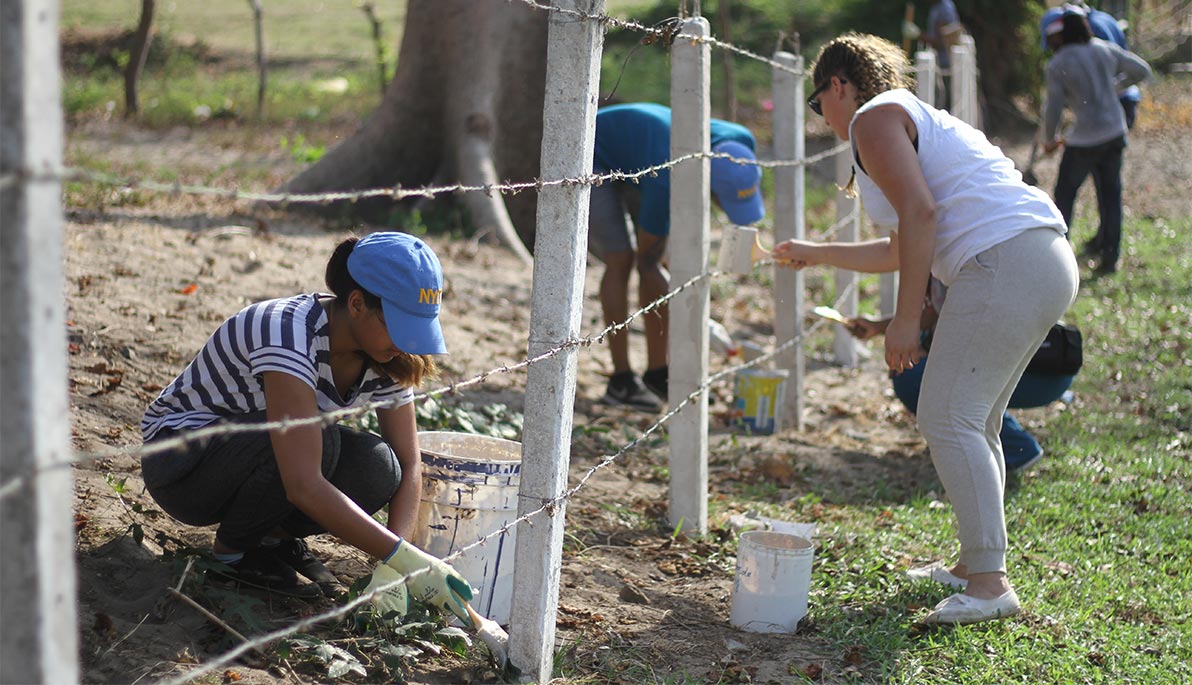News
Thirst for Change: Alternative Spring Break in Nicaragua
April 21, 2016
For the second year in a row, members of the NYIT community traveled to Nicaragua, the second-poorest country in the western hemisphere, on a service trip to share educational resources and address the country's lack of access to clean water. Eleven students, two staff leaders, and one faculty member formed the team that participated in the 2016 Alternative Spring Break program run by NYIT Career Services.
In El Coyol, Nicaragua, Team NYIT visited a public school and ran a two-day educational camp for more than 35 children, teaching them mathematics, science, engineering, English, geography, art, and sports. Through their work at the camp, NYIT students immersed children in an interactive style of teaching and learning, triggering their curiosity in various subjects, and exposing them to skills they need to impact change in their communities.
In addition, School of Education faculty member Luz Minaya (M.S. '11), director of field placements and certification, trained local teachers on how to incorporate technology in the classroom, using (and later donating) five digital tablets and five USB microscopes purchased by NYIT Career Services. NYIT students helped with the lessons. They also distributed 30 water filters and 10 rocket stoves to schools and community leaders to share with town residents most in need, and pitched in to renovate a basketball court.
"They live on a lot less than we do," said Adrian Bennett, a School of Engineering and Computing Sciences student who participated in the trip and shared his thoughts for the documentary Thirst, which recounts the team's experiences. "We have everything here in abundance while they have a very limited supply, and it's amazing to see how they make this limited supply of things work for them. The most obvious thing to me was how dry the place is and the fact that they don't really have an infrastructure for water that flows through the system."
Bennett learned water deliveries arrive every two weeks, not frequently enough for local residents. In the meantime, people travel many miles to get water from wells, and that water often sits in buckets for long stretches, making it susceptible to bacteria.
The team's work was a continuation of NYIT's 2015 Alternative Spring Break Program in Nicaragua. On that trip, participants surveyed three communities and noticed their citizens face a lack of access to clean water as well as limited ventilation in kitchens. Both cause health problems.
"We were worried that kids would develop kidney and stomach illnesses from drinking water from the wells," said Esmeralda Moraga, an El Coyol community leader and teacher at one of the schools to receive a water filter. "Now we don't have to worry about it, thanks to NYIT."
On April 8, Alternative Spring Break participants shared their insights at a documentary screening and panel discussion at NYIT Auditorium on Broadway in Manhattan. Watch the documentary on YouTube.
NYIT continues fundraising efforts for the communities visited in Nicaragua. To donate to the Alternative Spring Break Program, contact Larry Kamguia (M.A. '13), assistant director of NYIT Career Services, at lkamguia@nyit.edu. Donations fund educational resources or water filters, or help sponsor a child in Nicaragua.




